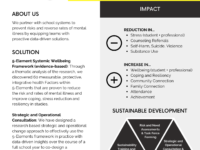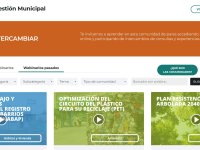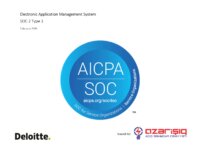Mind the Class, a mental health prevention organization, is partnering with school systems to reduce the risks and reverse the rates of mental and behavioral health disorders by creating a community ecosystem. This full year project collaboratively designs a preventive implementation plan using proven wellbeing research and data-driven solutions in collaboration with our University of Warsaw partners and through local public and private partners support sustainable development.
Innovation Tag: Evaluation and Oversight
The Municipal Management Portal is an online platform for local government policy practitioners to learn and share expertise and build collaborative networks across Argentina and internationally. The Portal is innovative not only through new applications of technology but also because it reflects a new conceptual understanding of Argentinian local government as open, professionalised and dynamic.
Case Study
Skrinja (Chest): Using Emerging Technologies for Better Digital Public Services and Data Driven…
The innovation has been developed to support data-driven decisions and to improve transparency and efficiency for better governance. Manual analytic work can be better organised and automated by offering self-serving dashboards and infographics. Data Warehouse and Business Intelligence are used as a central governmental platform to be offered as a service to the public sector. The project is introducing new concepts and tools of analytics and business intelligence in the public administration…
The Innovation Barometer is the world’s first official statistics on Public Sector Innovation (PSI), now implemented in 5 countries, providing innovators and decision makers with systematic knowledge of what thousands of innovators 'actually do’. The barometer advances PSI as a tool for solving societal problems and is used in practice for: inspiring innovation work, policymaking, strategising, executive leadership development, teaching, research and consultancy services.
Public sector innovation can drive better outcomes for citizens. However, successful innovative initiatives are the result of individual efforts, rather than an empowering environment. How can citizens be provided with access to data to hold their government to account? The Innovation Barometer will do this, giving officials and the public data, spotlighting shortcoming, and providing actionable steps to track changes overtime, improving government's ability to deliver public value.
The Ministry of Mines of Peru, alongside the IFC, BHP, various mining companies, and CISCO developed the Mining InfoCenter, a one-stop-shop social and digital innovation to provide mining-related information and capacity building to local leaders. The system will enable them to access information from the private and the public sector, build their capacities, and provide feedback to mining companies and the government, generating an informed dialogue that drives local development and contributes…
The Rosselkhoznadzor has developed an artificial intelligence model that can detect violations in all production chains of animal products in order to reduce the proportion of counterfeit and falsified products of animal origin on the market as much as possible. The innovation is beneficial to a healthy society, conscientious agricultural producers and the state.
Artificial intelligence methods for detecting violations have not been previously applied by the Rosselkhoznadzor.
Recruit Smarter is a multi-sector initiative of the Victorian Government and Melbourne University to develop inclusive recruitment practices and address unconscious bias in recruitment.
Internationally, Recruit Smarter is the first initiative of its kind, contributing findings to a growing body of research demonstrating the benefits of inclusive workplaces.
46 organisations across the public, private, non-government, and research sectors contributed to Recruit Smarter and its findings.
“TAKO – Moms” is the result of a project with the goal of developing a Minimum Viable Product to help tax administration service workers with customer service. TAKO is an online overview of all customers, which was created by the service workers themselves in collaboration with programmers. This process resulted in both exceptional improvements in the payment of VAT’s as well as large evolutions in the skills of the workers, without launching a high-cost project.
“Azerishiq” OJSC has created an innovative and enhanced e-service for providing electricity of up to 150 kilowatts to the existing or under-construction buildings of entrepreneurs. As a result of these reforms, entrepreneurs will be able to apply for an electricity connection through the One Window system online by visiting https://www.e-gov.az/en/login/?return=/az/services/readwidenew/3774/ website and the entrepreneur’s business will be provided with electricity within 20 days.



